- Home
- Franklin Horton
Brutal Business: Book Three in the Mad Mick Series Page 7
Brutal Business: Book Three in the Mad Mick Series Read online
Page 7
"It could have been an accident," Conor said. "Shuck might have fired on him before they recognized him."
“Shuck is a mean one,” Bernard said. “Sometimes he’s right with the Lord and attends church regular. Other times Satan holds sway over him and he don’t abide the teachings. Times like those he’s liable to do about anything.”
“Even killing a man?” Wayne asked.
Bernard became serious. “There’s those that say he’s done it before.”
“Bloody hell,” Conor muttered.
Bernard stiffened. "I’ll thank you not to use foul language in Miss Fannie Bell’s house. She don’t appreciate the dirty talk and I don’t either.”
Wayne groaned. "I give up, Conor. If you want to beat his ass go ahead. The boy is obviously too dumb to take a hint."
"I'll not do it myself," Conor said. "If the boy needs correction I think I’ll let Barb do it. The lad already appears to have a soft spot for her."
Bernard huffed. "That little girl of yours might be able to whoop up on an old man like Preacher White but I won’t sit and take it. I’m liable to throw her across my knee and show her who’s boss."
Conor and Wayne glared at him. Bernard swallowed, wondering if he’d stepped in a hole he was going to have to fight his way out of. Had he taken it too far? Had he finally pushed the Irishman over the edge? The tension grew so thick that Bernard broke into a sweat. Conor and Wayne broke into hysterical laughter.
Bernard was offended. He sputtered, assuring them he was fully capable of the threats he made. The more he said, the more they laughed. “I’ll do it,” he swore. “I don’t care how much of that Chinese karate crap she knows.”
Conor patted Bernard on the back. "You better take us to Shuck’s house. On the way you can tell us more about how tough you are."
“I bet he’s a regular Shuck Norris,” Wayne offered.
That cracked Conor up again and he laughed until his side hurt. Bernard stormed out of the house, his jug handle ears bright red with embarrassment.
10
Shuck's house was about eight miles from Fannie Bell’s. It took them nearly two hours to get there because Bernard wasn't a hundred percent certain where Shuck lived, though he swore he’d been there before. Conor had shoved the bill addressed to Charles Lampkins into his pocket because it had a street address on it but that proved to be of little help. There was nothing consistent about street numbers and 911 addresses in this part of the Appalachian Mountains.
Use of the word street was generous for some of the named roads in the area. They were more like hiking trails or unmaintained National Forest roads. In an area with high unemployment and widespread poverty, maintaining a driveway was a frivolous expense. Most people couldn’t afford gravel and asphalt. They couldn’t afford fancy contractors with heavy equipment. Sometimes the best they could hope for was to keep the road passable by filling the deepest ruts with rocks and crumbling shale.
When they finally found Shuck’s place they faced an altogether different issue than they expected. Shuck didn't have a driveway at all because he lived on the far side of the river. Instead of a driveway there was a wide spot on the public road where he could pull over and park. Groceries had to be carried across an ancient swinging bridge. The original building materials to construct the house must have been dragged through the river or driven across someone else’s bridge and hauled overland.
Shuck's house number was hand-painted and nailed to one of the support poles for the swinging bridge. Another hand-painted sign below it said trespassers would be shot and survivors would be shot twice. Conor couldn’t help but wonder if Fannie Bell’s dead son had failed to properly heed that warning.
Conor had them continue on by the bridge and out of sight of Shuck’s house. He didn’t want to draw the man’s attention by lingering there, just in case he was home and apt to carry out the warnings posted on his signs. He swung his horse around and faced Wayne.
"I want you to find a position where you can keep an eye on the front of the house. I'm going to go to find a way across the river and do a little recon," Conor said. "I’d like to get a handle on this character before we go knocking on the door and asking him questions."
"Why that's a bunch of bull hockey," Bernard spat. "I've knowed Shuck all my life and I ain’t a bit scared to go calling on him."
Before Conor could try to talk some sense into Bernard, he shoved himself off Wayne's horse and stomped back up the road toward the swinging bridge.
"Wait!" Conor hissed. “Get back here!”
Bernard waved him off, muttering as he continued up the road.
"Dammit, hold my horse," Conor said, slipping off his own horse and handing the reins over to Wayne.
Conor jogged off after the boy but didn't reach him before he broke cover and started up the wooden ramp to the swinging bridge. Conor called to him several more times but Bernard continued to ignore him. Conor didn’t follow the boy out into the open. He wasn’t going to blow this whole trip because of Bernard’s ignorance. He crouched behind a cluster of dead, leafless briars and watched the house through tiny binoculars. Though the lad clomped loudly across the bridge planks, Conor saw no reaction from the house.
A loud crack split the air and Conor snapped his attention back toward Bernard. A board had broken beneath the boy's feet and he’d dropped like falling through a trap door. He attempted to catch himself, temporarily halting his fall by latching onto the next board in front of him. Then it cracked too, and his body slipped below the level of the bridge, hanging from it as if he were doing a pull-up.
While Conor was searching for some way to salvage the situation, to rescue Bernard, there was another loud crack. Bernard screamed at the top of his lungs as the board he clung to broke in half and he dropped. Conor grimaced as the boy fell. He listened for a splash, the blessing of a soft landing, but none came. There was a wet thud, then nothing. No pleas for help. No sobs of pain.
As stealthily as he could, Conor slithered forward to peer down the riverbank toward the bridge. He spotted Bernard’s body broken and splayed awkwardly on a rock the size of a car hood. It was submerged about an inch below the surface of the water. Bernard’s misshapen head was covered in blood and dark water lapped at it, creating a trace of red in the river. There was no way he was alive.
“Shit,” Conor whispered. He’d been trying to think of a way to rescue the boy but he didn’t have rope and it was clear the bridge wasn’t an option. Had he run out onto it there might be two broken bodies in the river.
He examined the swinging bridge with his binoculars and found that some of the boards didn't match the others. In fact, all of the broken boards were newer, which made little sense at all until he examined it closer. He noticed that one of the broken boards, still dangling from the support cable, had been sawn mostly in two.
From the top it would have appeared normal but there was barely a hint of wood holding the board intact as it spanned the cables. When Bernard stepped on it, he would have had just enough time to realize his error before it gave way. Who knew how many boards were booby-trapped like that? The bridge definitely wasn’t a viable option for getting to the house.
There was a flicker of movement from the direction of the house and Conor swung his binoculars in that direction. A man, presumably Shuck Lampkins, had come out from the house and was standing on the porch with a rifle. It hung at his side, which led Conor to believe that the man hadn’t seen him or Wayne. He clomped down the steps in unlaced boots and headed across the yard toward the swinging bridge.
Conor studied Shuck’s face for a trace of concern or remorse but found none of that. If anything, Conor detected a grim satisfaction in the man’s expression, a smirk of satisfaction that his booby trap had worked as intended. Shuck set his rifle down, leaning it against the aluminum frame of an old lawn chair with no seat in it. He picked up a homemade grappling hook made of welded rebar and cast it toward Bernard’s body. It took a few attempts before he snagged
the hem of the young man’s coat. With some tugging, he dragged the body from the rocks and let the current take it, carrying away the evidence of what had taken place. Having seen this, Conor could easily imagine how the body of Fannie Bell’s son might've ended up downriver. Shuck had done this before. He knew just how to get rid of the body.
Shuck must have heard a noise because he spun and glared toward the house. Conor swung the binoculars in that direction and was shocked by what he saw. An elderly woman stood naked on the porch, her hands clutched around her shaking body. The temperature was in the forties, cold enough that a person could die of hypothermia if they went prancing around the yard in their altogether. The chimney told him they had a fire inside. What made her come outside in that state? Had Bernard interrupted a romantic moment?
Conor felt guilty about seeing her this way, so exposed and vulnerable. He was trying to get a good look at her face so he could see if this was Fannie Bell, the same woman he’d seen in the picture on the refrigerator, but he couldn’t tell yet. She kept moving, shivering and twisting in the cold. She took a step, almost a stagger, and there was something off about it. Was her foot injured?
He glanced down and immediately spotted it. There was something around her ankle. It was a lightweight chain like one used to tether out a dog. It was fastened tightly around her ankle and he thought he could make out a padlock securing it. Had Conor not seen this chain, he would have assumed the woman had taken shelter here of her own accord. It made sense that a woman of her age might seek safety with other folks. That she would go to a man she appeared to have a relationship with was logical. If not for that chain, Conor would have returned to tell Pastor White’s people that Fannie Bell was fine and living safely with Shuck Lampkins in his house on the river.
But this was clearly not consensual.
Fannie Bell appeared to be a prisoner, and an ill-treated one at that. Ugly red streaks of infection started at the chained ankle and rose up her pale and venous legs. Purple blotches and black bruises wrapped her thin body. When she turned and he had a better view her face, Conor found it to be sallow and hopeless. One of her eyes was black and nearly swollen shut. Conor’s blood boiled.
Shuck only returned to the porch when he was certain the body had washed out of sight. He stepped right by Fannie Bell and barged through the open door. He must have said something to her, though, because the elderly woman followed quickly behind him, her posture submissive. Broken.
When Shuck was gone, Conor retreated, working his way back to where Wayne waited with the horses. The man was solid. Despite his curiosity at what must have been taking place with Bernard, he stood his ground and remained with the horses.
"Where's that dumbass Bernard?" Wayne asked.
"Dead. He wouldn’t listen to me and took off across the bridge. Some of the boards were booby trapped. He fell through into the river."
"And you’re sure he’s dead?"
Conor nodded. "His head broke open like a melon. Then Shuck tugged him into the river and let the evidence float away."
“It’s hard to fault a guy for protecting his place,” Wayne said. “We’ve all done it.”
“I’ve never killed innocent people for approaching my house. I at least attempt to find out who they are first. The one exception is if they’re in the company of a known bad guy. Then they’re fair game because of their poor life choices.”
“What am I going to tell that kid’s parents?”
“That ain’t all of it. I think Fannie Bell is here. She's being held prisoner by this sadistic prick. She's chained like a dog and beaten all to hell."
Wayne’s immediate reaction was disbelief. “Chained? That tiny old lady from the picture?”
Conor nodded. “It was padlocked around her leg and the leg was all infected. There were bruises all over her.”
“How could you tell they were all over her?”
“She was naked as the day she was born.”
Wayne was silent, processing this information, but his feelings were evident. Any man who would treat anyone, especially an old lady, like that deserved a good dose of the same. Perhaps a fatal overdose of the same treatment. There would be no mercy.
"I'm assuming the bridge is not the best option to get to him?" Wayne asked.
"Besides the sabotaged bridge, it’s way too exposed. He’d see us coming and we’d be sitting ducks. We need to find another way across and work our way back here. I wonder where the nearest bridge is. I can’t remember the last one we passed.”
“Ahead,” Wayne said. “There’s a coal mine. I went there once to scavenge some scrap metal for a project at the firehouse. One of the locals told me about it.”
“How far?”
“A couple of miles as I recall.”
11
Conor was always impressed by the infrastructure of the mining industry. As a welder, fabricator, and machinist he had a love for the big machines. Some mines were small operations, cut into the face of a hill to chase small seams. Those had little permanent infrastructure and would be abandoned when the coal was mined out.
Other operations were more permanent, running continuously for over a hundred years and covering hundreds of square miles underground. They had massive multi-story green buildings on the top side connected by conveyors. Crude steel elevators with large pulleys hoisted men and machines underground. Once down in the mines, some of the larger operations had nearly as much infrastructure underground, including repair shops, break rooms, and offices.
Had Conor not already had a location that he loved, one of these mines would have been a second choice. They were surrounded by open yard so anyone in the house could see someone coming for a long distance. The tall buildings created the perfect vantage point for observing or sniping. The covered conveyors provided a concealed means for moving between buildings unobserved. Then there were the shops, and Conor was a sucker for a good shop.
“This place is huge,” Wayne said, stating the obvious as they rode across the bridge.
There was no concern that this bridge might be sabotaged in a similar manner. It was designed to carry semi-trucks hauling coal or lowboy trailers carrying in mining equipment, some of it so large it had to arrive in pieces. The steel I-beams supporting the bridge were at least three feet tall and would require a serious blast to compromise.
Conor sniffed the air. “Coal smoke.” It had a distinctive odor to it that smelled like nothing else.
“There,” Wayne said, pointing at a low green building with thick smoke spewing from a metal chimney.
“Let’s give them a wide berth,” Conor said. “They may consider us trespassers and we’ve already got enough on our plate for the day.”
Once they’d crossed the bridge, they swung hard to the right, sticking close to the river. It put their backs to the occupied building so the men had their heads on a constant swivel, checking to make sure no one was coming for them. They cringed at the sound of their horses’ hooves on the hard pavement and couldn’t wait until they had dirt beneath them.
The facility was huge. The vast complex appeared almost alien in the remote hollows of Appalachia but they were found everywhere there was coal. It was almost like an airport with its long stretches of asphalt and concrete, though these facilities were significantly more cluttered than an airport would ever be. Broken machinery sat scattered around the plant, along with rusting shipping containers and piles of steel beams. Conor couldn’t help but be distracted by it all. Where most saw junk, he saw potential.
Eventually the pavement turned to gravel and, a short distance past that, to an artificially flat expanse of weeds. When they finally moved beyond the reach of the coal company’s dozers, the land returned to its natural contours again. Close to the river they found a clear trail, just as they expected. Fishermen, deer, and bear kept the trail beaten down but they soon found it wasn’t tall enough for a man riding a horse. After they dismounted and walked their horses a little further, the path became too rough f
or a horse to traverse at all. There were downed trees that required ducking beneath or climbing over. There were boulders sitting at odd angles that were simply too dangerous to take a horse over.
“Do we leave the horses here?” Wayne asked.
“I hate to leave horses behind,” Conor said. “They’re too valuable. They’d tempt even an honest man if he saw them sitting here unattended.”
“I don’t like the idea of you going on alone either.”
Conor grinned. “Maybe I was going to send you on alone while I had a nap.”
“Yeah, I bet you were.”
“The other side of the coin is that I’m not sure I can bring Fannie Bell back by this route. Poor thing appears too frail to be bushwhacking the riverbank like a fur trapper. I’d have to carry her and I’m not exactly in my prime. I’d probably fall and kill both of us.”
“Well, you can’t take her across that swinging bridge at Shuck’s house either, can you? Not with those damaged boards.”
“If I don’t have to worry about Shuck shooting at me, I could take my time and lay down long planks to span the length of the bridge. Then we could probably walk across it with no worries.”
“So you want me to be waiting there at the bridge with the horses?” Wayne asked.
Conor nodded.
“That means you’re going to have to kill Shuck. That’s the only way you’ll buy yourself enough time to safely cross the swinging bridge.”
“That’s a given. I made my mind up about that when I saw the condition of that old lady,” Conor said. “We don’t need people like that in our community. Hell, we don’t need them in our world.”
“You comfortable with being judge, jury, and executioner?” There was no malice or accusation in the question.
Conor didn’t hesitate. “Yes, I am.”
Wayne acknowledged the response with a nod. “Then let’s get on with it.”

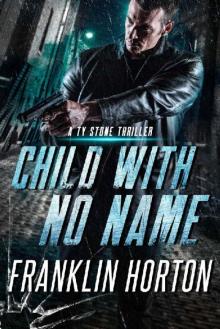 Child With No Name
Child With No Name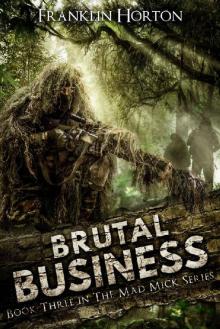 Brutal Business: Book Three in the Mad Mick Series
Brutal Business: Book Three in the Mad Mick Series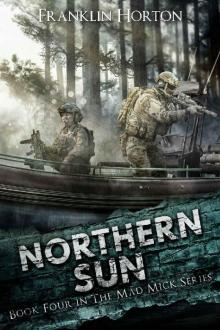 Northern Sun: Book Four in The Mad Mick Series
Northern Sun: Book Four in The Mad Mick Series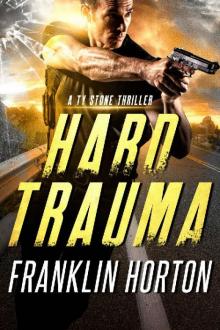 Hard Trauma
Hard Trauma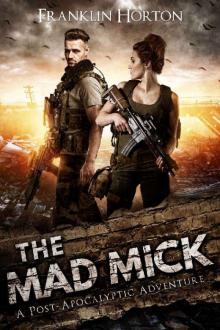 The Mad Mick: Book One of The Mad Mick Series
The Mad Mick: Book One of The Mad Mick Series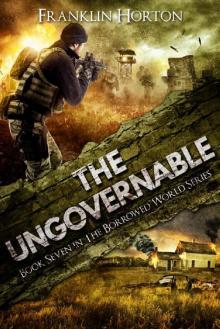 The Ungovernable
The Ungovernable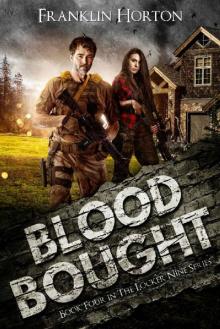 Blood Bought: Book Four in The Locker Nine Series
Blood Bought: Book Four in The Locker Nine Series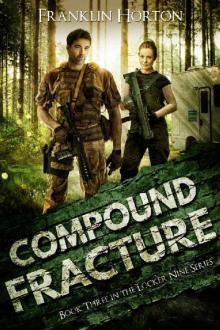 Compound Fracture
Compound Fracture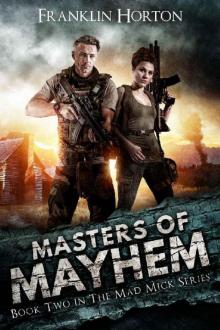 Masters of Mayhem
Masters of Mayhem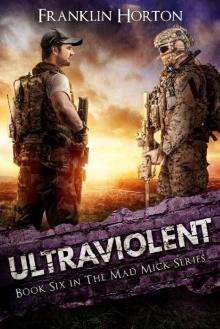 Ultraviolent: Book Six in The Mad Mick Series
Ultraviolent: Book Six in The Mad Mick Series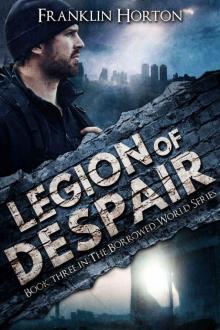 The Borrowed World (Book 3): Legion of Despair
The Borrowed World (Book 3): Legion of Despair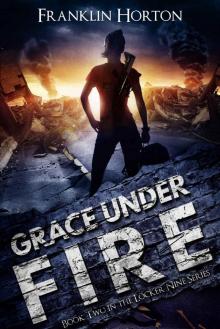 Grace Under Fire: Book Two In The Locker Nine Series
Grace Under Fire: Book Two In The Locker Nine Series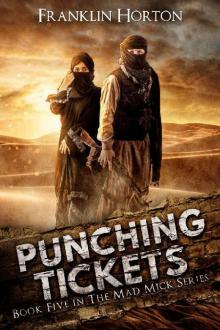 Punching Tickets: Book Five in The Mad Mick Series
Punching Tickets: Book Five in The Mad Mick Series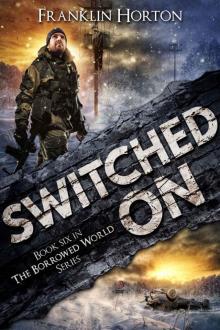 Switched On: Book Six in The Borrowed World Series
Switched On: Book Six in The Borrowed World Series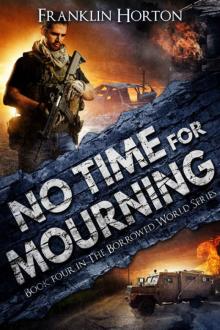 No Time For Mourning: Book Four in The Borrowed World Series
No Time For Mourning: Book Four in The Borrowed World Series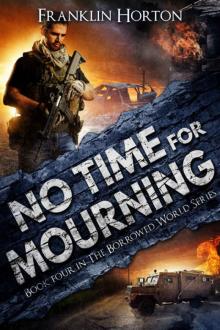 The Borrowed World (Book 4): No Time For Mourning
The Borrowed World (Book 4): No Time For Mourning Random Acts
Random Acts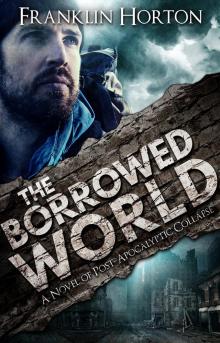 The Borrowed World: A Novel of Post-Apocalyptic Collapse
The Borrowed World: A Novel of Post-Apocalyptic Collapse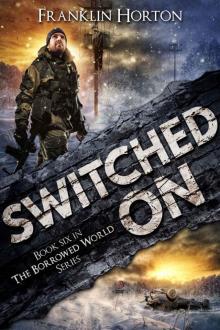 Switched On
Switched On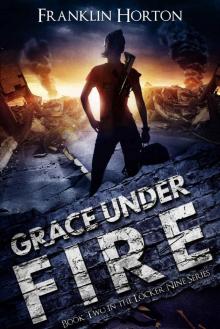 Grace Under Fire
Grace Under Fire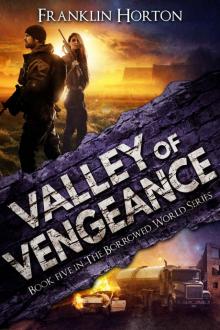 Valley of Vengeance: Book Five in The Borrowed World Series
Valley of Vengeance: Book Five in The Borrowed World Series